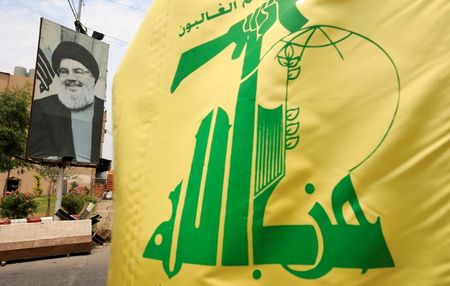
Factbox-What is Lebanon’s Hezbollah?

(Reuters) – Hezbollah began importing Iranian fuel to Lebanon via Syria on Thursday, a move the Shi’ite Islamist group says aims to ease a crippling energy crisis but which its opponents say may expose the country to the risk of U.S. sanctions. Organised by Hezbollah, the shipment marks a significant expansion of its role in Lebanon.
What is Hezbollah?
HISTORY:
* Founded in 1982 by Iran’s Revolutionary Guards and classified by the United States and other Western countries as a terrorist organisation, Hezbollah (Party of God) is the most powerful group in Lebanon because of a heavily armed militia that fought several wars with Israel. It grew stronger after joining the war in Syria in 2012 in support of President Bashar al-Assad.
* It is both a political movement and guerrilla army, drawing its support from among Lebanon’s Shi’ite population. The group and its allies helped form Lebanon’s current government.
* Hezbollah’s arsenal has been a big point of contention. The group says its arms are needed to deter Israel and, more recently, to guard against Islamist insurgents in Syria. Its opponents say the group undermines the state, taking decisions on war and peace that affect the entire nation.
* Hezbollah has been designated a terrorist organisation by the United States, Canada, Germany, Britain, Argentina and Honduras as well as the U.S.-allied, mainly Sunni Muslim Gulf Cooperation Council, which includes Saudi Arabia, the United Arab Emirates, Bahrain and Kuwait. The European Union classifies Hezbollah’s military wing as a terrorist group, but not its political wing.
* Shadowy groups, which Lebanese security officials and Western intelligence say are linked to Hezbollah, launched suicide attacks on Western embassies and targets and kidnapped Westerners in the 1980s. A suicide bombing destroyed the U.S. Marine headquarters and French military barracks in Beirut in 1983, killing 241 U.S. servicemen and 58 French paratroopers. One group, Islamic Jihad, was thought to be led by Imad Moughniyah, a senior Hezbollah military commander who was killed in a car bomb attack in Syria in 2008.
* Argentina blames Hezbollah and Iran for the deadly bombing of a Jewish community center in Buenos Aires in which 85 people were killed in 1994 and for an attack on the Israeli embassy in Buenos Aires in 1992 that killed 29 people. Both deny any responsibility.
* Bulgaria accuses Hezbollah of carrying out a bomb attack that killed five Israeli tourists in the Black Sea city of Burgas in 2012.
GOVERNMENT:
* 2005: Hezbollah entered Lebanese politics more visibly after the killing of former Prime Minister Rafik al-Hariri and the withdrawal of Syrian troops from Lebanon. A coalition of anti-Syrian factions took power following an election which gave Hezbollah 14 seats in the 128-seat parliament.
* 2006: Hezbollah and its allies quit a government led by Western-backed Prime Minister Fouad Siniora over the governing coalition’s refusal to give the opposition effective veto power.
* 2008: Hezbollah clashed with domestic foes and briefly seized west Beirut in the worst civil strife since the 1975-1990 civil war, after the government vowed to take action against the group’s military communications network. After mediation, rival leaders signed a deal to end 18 months of political conflict.
* 2011: Syria’s civil war led to years of political paralysis in Lebanon. In January, the first government of Saad al-Hariri was toppled when Hezbollah and its allies quit over the U.N.-backed tribunal set up to prosecute those behind the assassination of his father, Rafik al-Hariri. Six months later, Prime Minister Najib Mikati announced a government dominated by Hezbollah and its allies.
* 2016: Saad al-Hariri, who spent years abroad because of security fears, reached a deal making Hezbollah ally Michel Aoun president, and him premier. Saad al-Hariri’s ties with backer Saudi Arabia, furious at Hezbollah’s expanding role, hit a nadir in 2017.
* 2018: Hezbollah and its allies won a parliamentary majority.
* 2019: Protests broke out against a deep economic crisis. Hariri quit in October. Hezbollah and its allies backed Hassan Diab as premier. He formed a new government in January 2020.
CONFLICTS
* U.N. Security Council Resolution 1559, sponsored by the United States and France and adopted in 2004, called for all Lebanese militias to be disbanded and disarmed. Hezbollah is the only militia to keep its arms since the civil war.
* 2012: Hezbollah fighters deployed in Syria to aid Syrian government forces facing a mostly Sunni rebellion against Assad. The group played a role in helping beat back the rebellion.
* 2006: Hezbollah crossed the border into Israel, kidnapped two Israeli soldiers and killed others, sparking a five-week war that killed 1,200 people in Lebanon, mostly civilians, and 158 Israelis, mostly soldiers.
* Hezbollah waged a prolonged military campaign against Israeli forces which occupied south Lebanon until their withdrawal in 2000.
HARIRI ASSASSINATION
* In 2020, a U.N.-backed court convicted a Hezbollah member of conspiring to kill Rafik al-Hariri in a 2005 bombing. Hezbollah has denied any involvement in Hariri’s killing. Its leader Sayyed Hassan Nasrallah said it was not concerned with the trial and that if any members of the group were convicted, it would stand by their innocence.

















POST COMMENTS (1)
RSG